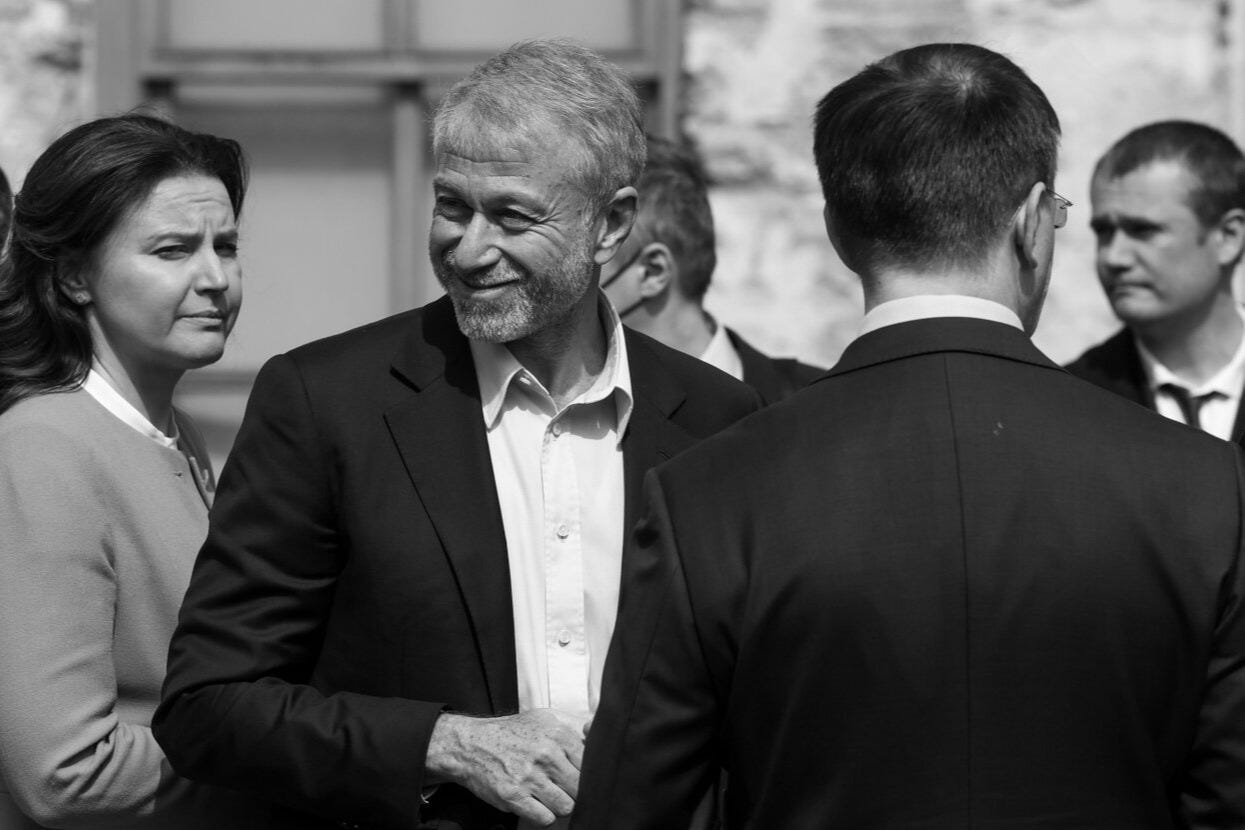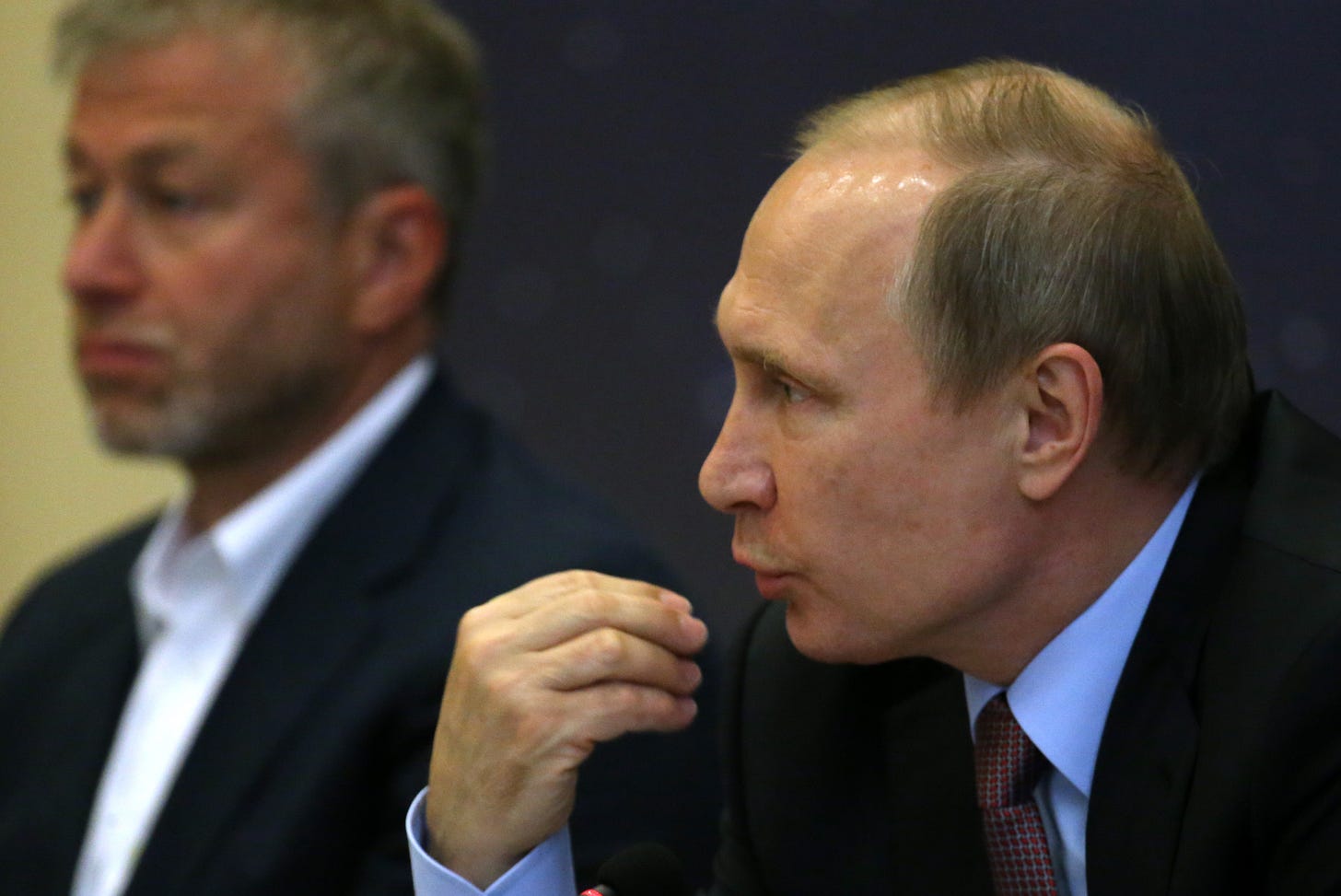Ex-Chelsea boss accused of election meddling in Moldova
Roman Abramovich, the Russian oligarch and former owner of Chelsea FC, has been accused of funding a Kremlin-backed campaign to interfere in Moldova’s presidential election.
Welcome to Sports Politika, a media venture founded by investigative journalist and researcher Karim Zidan that strives to help you understand how sports and politics shape the world around us. Our mission is to offer an independent platform for accessible journalism that raises awareness and empowers understanding.
If you share this vision, please consider supporting us by joining our community and becoming a paid subscriber.
Last week, Moldova’s Security and Intelligence Service (SIS) released a report on electoral interference detected in the lead-up to October’s presidential election. Among the figures singled out by authorities is Roman Abramovich, the Russian oligarch and former owner of Chelsea FC.
The report, which was published on the SIS website, detailed the various ways that Russia allegedly attempted to interfere in Moldova’s electoral process, ranging from attempted cyberattacks and propaganda campaigns, to voter bribery. The Moldovan intelligence agency emphasized that effort was coordinated through Ilan Shor, a pro-Russian Moldovan politician who fled the country on charges of money laundering following a bank fraud scandal. He currently resides in Moscow after receiving Russian citizenship.
According to the report, Shor met with Abramovich during a trip to France in November 2023, where he allegedly received assurances from the oligarch. Shor went on to establish the pro-Russia Victory political bloc in Moldova in April 2024. The electoral bloc opposed Moldova’s alignment with the West, including European integration. However, the bloc was denied recognition and certification by Moldova’s electoral commission, barring it from participating in the 2024 election.
Shor’s political bloc received legal support from Rola Brentlin, who is Abramovich's personal assistant, according to the SIS. Brentlin was also a former executive at Chelsea FC until January 2022, which coincides with Abramovich’s ownership of the club.
Abramovich purchased Chelsea FC in 2003, ushering in a new era of ownership in European football. With the oligarch’s vast financial resources, the club immediately embarked on ambitious development program that allowed it to compete with dynastic clubs like Manchester United and Real Madrid.
Chelsea would go on to win 18 major trophies during Abramovich’ tenure as the club’s owner. His success elevated him to Russia’s most famous oligarch and served as a blueprint for Abu Dhabi’s eventual purchase of Manchester City, Qatar’s purchase of Paris Saint-Germain, and Saudi Arabia’s takeover of Newcastle United. He remained one of the sport’s most powerful figures until February 2022, when Russia’s invasion of Ukraine shone an uncomfortable spotlight on his ties to Russian president Vladimir Putin.
Abramovich, an oil baron who formerly served as governor of Chukotka, an autonomous region in Russia, faced sanction in the United States the United Kingdom, the European Union, Canada, and several other countries. Yet despite denying any close relationship with Putin or the Kremlin, Abramovich was forced to sell Chelsea in May 2022.
Despite being subjected to EU sanctions, Abramovich also retains a “financial connection” to Dutch football club Vitesse he secretly bought while he was Chelsea owner. The club has been under investigation by the Ministry of Economic Affairs for reported ties to Russia.
The findings exposed how Abramovich has bypassed EU sanctions using a web of associates and shell companies spanning multiple countries. Similarly, the SIS report highlights how the oligarch employs comparable tactics in his bid to influence Moldova’s election.
Abramovich’s alleged interference, however, was unsuccessful. Incumbent president Maia Sandu, a pro-European defeated the Russia-friendly General Alexandr Stoianoglo in the October election to secure her second and final term. On that same day, a majority of Moldovans voted “yes” in a referendum on potential integration with the EU.
The result was a blow to Moscow, which has spent months competing with the West for influence in neighbouring Moldova. It was also in stark contrast to the result in Georgia, where former Manchester City player Mikheil Kavelashvili became president of Georgia in a result which the opposition called a blow to the country’s EU aspirations.
Georgia’s ruling party has become increasingly authoritarian in recent years, cracking down on freedom of speech, dissent, and LGBTQ+ rights. The party’s decision to suspend talks over Georgia’s bid to join the EU led to widespread protests over the past month. Riot police detained hundreds of protestors and injured countless others during the subsequent crackdown.
In turn, Georgian Dream nominated Kavelashvili as its presidential candidate. He easily won the vote, as he was the only candidate on the ballot and Georgian Dream was in control of the 300-seat electoral college that had replaced direct presidential elections in 2017. It was the first time in Georgian history that a presidential candidate ran unopposed.
Sports Politika is a media platform dedicated to the intersection of sports, power and politics. If you like what you see, upgrade to a paid subscription ( or gift a subscription if you already have your own). We would appreciate if you could also like the post and let us know what you think in the comment section below.




